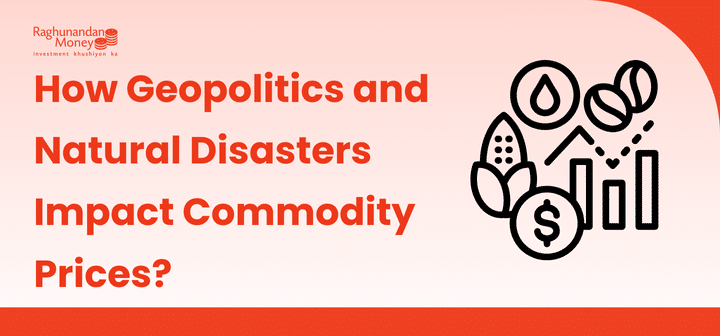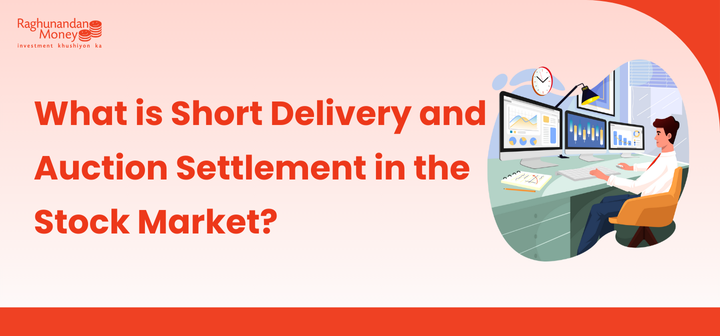Disclaimer: This content is solely for educational purposes. The securities/investments quoted here are not recommendatory.
In today’s interconnected world, globalization and rapid urbanization have strengthened international trade and economic ties. However, they have also increased the exposure of commodity markets to external risks such as geopolitical tensions and natural disasters.
Political uncertainty, wars, trade restrictions, and extreme weather events can significantly impact commodity prices, disrupt supply chains, and alter global trade flows.
This blog explores the impact of geopolitics and natural disasters on commodities and how traders can manage associated risks.
Geopolitical Factors Affecting Commodity Prices
Most economies are interconnected, with commodities being imported and exported globally. While this has boosted trade efficiency, events such as wars, sanctions, and policy changes can lead to supply disruptions and price fluctuations.
1. War & Political Instability
Wars and political instability can disrupt production, transportation, and trade of commodities. This can lead to supply shortages and price surges.
Example: The Russia-Ukraine War (2022) caused a sharp rise in global wheat, oil, and gas prices due to supply chain disruptions. Ukraine, a major wheat exporter, faced logistical challenges, pushing wheat prices to multi-year highs.
2. Sanctions & Trade Restrictions
Sanctions or trade bans limit a country’s ability to export commodities, reducing global supply and increasing price volatility.
Example: The U.S. sanctions on Iranian oil restricted supply, leading to higher oil prices and increased volatility in global energy markets.
3. OPEC & Oil Price Control
The Organization of Petroleum Exporting Countries (OPEC) plays a crucial role in setting global oil prices by adjusting production levels.
Example: In 2022, OPEC+ decided to cut oil production, leading to a rise in global crude oil prices.
4. Trade Wars & Tariffs
Trade conflicts between major economies can impact commodity prices by altering supply-demand dynamics.
Example: The U.S.-China Trade War (2018) led to higher tariffs on soybeans, metals, and electronics, impacting global trade flows and commodity prices.
5. Export Bans & Government Policies
Governments may impose restrictions on exports to protect domestic markets, affecting global commodity availability.
Examples:
- India temporarily banned wheat exports in 2022 to secure domestic supply, affecting global wheat prices.
- Indonesia banned palm oil exports, leading to price spikes in edible oil markets.
Natural Disasters and Commodity Market Disruptions
Apart from geopolitical events, natural disasters like hurricanes, droughts, wildfires, and earthquakes significantly impact commodity production and supply chains.
1. Climate Change & Agricultural Commodities
Extreme weather patterns, such as droughts and floods, disrupt agricultural production, leading to price volatility.
Example: In 2024, prolonged droughts in Brazil impacted the yield of Arabica coffee beans, driving coffee prices to a 50-year high.
2. Hurricanes & Energy Supply Chains
Hurricanes can damage oil refineries, disrupt transportation, and halt energy production.
Example: Hurricane Katrina (2005) caused severe oil and natural gas supply disruptions in the U.S., leading to a surge in crude oil prices.
3. Earthquakes & Mining Disruptions
Earthquakes damage mining infrastructure, leading to production delays and commodity shortages.
Example: The 2010 Chile Earthquake (8.8 magnitude) disrupted copper mining operations, pushing copper prices higher due to reduced supply.
4. Wildfires & Lumber Prices
Wildfires destroy forests, impacting lumber supply and increasing prices.
Example: Canada’s wildfires (2023) led to sawmill closures and supply shortages, causing lumber prices to surge.
5. Tsunamis & Global Shipping Disruptions
Tsunamis disrupt port operations, shipping routes, and supply chains, affecting global commodity trade.
Example: The 2011 Japan Tsunami damaged ports and nuclear plants, disrupting energy and raw material supply chains worldwide.
Case Studies: How Geopolitics and Natural Disasters Impact Commodity Markets
| Event |
Commodity Affected |
Market Impact |
| Russia-Ukraine War (2022) |
Wheat, Oil, Gas |
Global wheat and fuel prices surged due to supply chain disruptions. |
| U.S.-China Trade War (2018) |
Soybeans, Metals |
Tariffs reduced U.S. soybean exports, affecting global prices. |
| Hurricane Katrina (2005) |
Crude Oil, Natural Gas |
Energy prices soared as refineries shut down. |
| Brazil Drought (2024) |
Coffee |
Coffee prices hit a 50-year high due to low yield. |
| Indonesia Palm Oil Export Ban (2022) |
Palm Oil, Edible Oils |
Restricted supply caused global food inflation. |
How Traders and Investors Can Mitigate Risks?
Although traders and investors cannot control external factors, they can adopt risk management strategies to mitigate their impact.
1. Diversifying Across Commodities
Holding a mix of different commodities helps spread risk.
- Example: Investing in both gold (safe-haven asset) and crude oil (cyclical commodity) can balance portfolio risk.
2. Hedging with Futures & Options
Hedging protects against price fluctuations by locking in commodity prices.
- Futures contracts help secure prices in advance.
- Options contracts provide downside protection during uncertainty.
3. Tracking Global Economic & Political Trends
Monitoring political events, economic reports, and policy changes helps traders anticipate price movements.
- Example: Tracking OPEC decisions before trading oil futures can provide insights into potential price movements.
4. Investing in Safe-Haven Assets
During geopolitical uncertainty, investors often shift towards gold and silver, which are considered inflation hedges.
- Example: Gold prices tend to rise during political or economic instability.
5. Using Technical & Fundamental Analysis
Combining fundamental analysis (macroeconomic trends, seasonal patterns) and technical analysis (chart patterns, indicators) helps identify trading opportunities.
Conclusion
The commodity market is vital to the global economy, but it remains vulnerable to geopolitical conflicts and natural disasters. Understanding how these events affect commodity prices allows traders to make informed decisions and adopt strategies to mitigate risk.
Key Takeaways:
- Geopolitical events (wars, sanctions, OPEC policies) impact commodity prices.
- Natural disasters (hurricanes, droughts, earthquakes) disrupt supply chains.
- Diversification and hedging help traders manage risks.
- Tracking global trends improves decision-making.
- Safe-haven assets like gold offer stability during crises.
By staying informed and implementing effective risk management strategies, traders can navigate commodity market volatility with confidence.
FAQs
1. How do geopolitical risks impact commodity markets?
Geopolitical risks like wars and political instability disrupt supply chains and production, leading to higher commodity prices.
2. Which commodities are most affected by natural disasters?
- Agricultural commodities (wheat, coffee) are affected by droughts and floods.
- Metals and energy commodities (crude oil, copper) are impacted by earthquakes and hurricanes.
3. Why do oil prices rise during geopolitical tensions?
Oil prices rise because conflicts and sanctions disrupt energy production and supply chains, increasing uncertainty.
4. How does climate change affect commodity prices?
Climate change leads to droughts, wildfires, and floods, reducing crop yields and increasing commodity prices.
5. What are the best strategies to hedge against geopolitical risks?
Traders can hedge positions using futures and options or diversify holdings across commodities to reduce risk exposure.
Need Help?
Contact RMoney at 0562-4266600 / 0562-7188900 or email us at askus@rmoneyindia.com

Stock Trading Now trade in ₹9 Per Order or ₹ 999 Per Month Plans.
Future & Options Access F&O contracts with advanced tools for hedging and speculation.
Currency Trading Trade in major currency pairs and manage forex exposure efficiently.
Commodity Trading Diversify Trading with MCX & NCDEX by Trading in Gold, Silver, Base Metals, Energy, and Agri Products.
Margin Trading Funding Boost your buying power with upto 5X, Buy now Pay Later
Algo Trading Back test, Paper Trade your logic & Automate your strategies with low-latency APIs.
Trading View Leverage Trading View charts and indicators integrated into your trading platform.
Advanced Options Trading Execute multi-leg option strategies with precision and insights.
Stock Lending & Borrowing Earn passive income by lending stocks securely through SLB.
Foreign Portfolio Investment Enable NRIs and FPIs to invest in Indian markets with ease and compliance.
IPO Invest in upcoming IPOs online with real-time tracking and instant allotment updates.
Direct Mutual Funds 0% Commissions by investing in more than +3500 Direct Mutual Fund Scheme.
Corporate FDRs Earn fixed returns with low-risk investments in high-rated corporate fixed deposits.
Stocks SIPs Build long-term wealth with systematic investment plans in top-performing stocks.
Bonds & NCDs Access secure, fixed-income investments through government and corporate bond offerings.
Depository Services Safely hold and manage your securities with seamless Demat and DP services with CDSL.
Journey Tracing our growth and milestones over time.
Mission & Vision Guided by purpose, driven by long-term vision.
Why RMoney Platform Smart, reliable platform for all investors' needs.
Management Experienced leadership driving strategic financial excellence.
Credentials Certified expertise with trusted industry recognition.
Press Release Latest company news, updates, and announcements.
Testimonials Real client stories sharing their success journeys.
7 Reasons to Invest Top benefits that make investing with us smart.
SEBI Registered Research Trusted insights backed by SEBI-compliant research.
Our Technology Advanced tools enabling efficient online trading.
Calculators Access a suite of smart tools to plan trades, margins, and returns effectively.
Margin Calculator Instantly check margin requirements for intraday and delivery trades.
MTF Calculator Calculate MTF funding cost upfront to ensure full transparency before placing a trade.
Brokerage Calculator Know your exact brokerage charges before placing any trade.
Market Place Explore curated investment products and trading tools in one convenient hub.
RMoney Gyan Enhance your market knowledge with expert blogs, videos, and tutorials.
Performance Tracker Track our research performance with full transparency using our performance tracker.
Feedback Share your suggestions or concerns to help us improve your experience.
Downloads Access important forms, software, and documents in one place.
Locate Us Find the nearest RMoney branch or service center quickly.
Escalation Matrix Resolve issues faster with our structured support escalation process.
Back Office Log in to view trade reports, ledger, and portfolio statements anytime.
Account Modification Update personal or bank details linked to your trading account.
Fund Transfer Transfer funds instantly online with quick limit updation to your trading account.
Bank Details View our registered bank account details for seamless transactions by NEFT, RTGS or IMPS.
How to Apply IPO Step-by-step guide to apply for IPOs using your trading account.
RMoney Quick Mobile App Trade on-the-go with our all-in-one mobile trading app.
RMoney Quick login Quickly access your trading account through the RMoney Quick web-based trading.
RMoney Rocket Web Version Experience powerful web-based trading with advanced tools for algo traders.
RMoney Rocket Mobile Version Trade anytime, anywhere with our feature-rich mobile trading platform.




















